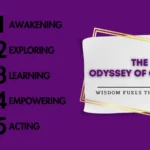In a rapidly evolving world, it’s essential to find the strength and wisdom to navigate life’s challenges. This pursuit of virtue and resilience is a common thread between Christian and Stoic teachings. Both philosophies offer timeless wisdom to empower our minds and ignite the courage within. In this blog post, we’ll explore how Christian and Stoic principles can work in tandem to help us develop wisdom and courage in our lives.
The Christian Perspective:
Christian teachings emphasize faith, hope, and love as the cornerstone virtues in the pursuit of a meaningful life. With a focus on the love of God and neighbor, Christians are encouraged to practice humility, forgiveness, and patience. These virtues empower wisdom by teaching us to see beyond our own desires and consider the greater good.
Courage, in the Christian context, is often linked to faith. It’s the ability to trust in God’s plan and face adversity with confidence, even when the outcome is uncertain. Jesus Christ is the ultimate example of courage in Christian teachings, as he willingly faced crucifixion to fulfill his mission and save humanity.

The Stoic Perspective:
Stoicism, a philosophical school founded in Athens in the 3rd century BCE, is centered on the cultivation of wisdom, courage, justice, and temperance. Wisdom, in Stoic thought, is the ability to reason and discern the truth, while courage involves facing challenges with resilience and perseverance.
Stoicism teaches that we should focus on the things within our control and accept those beyond our influence. This philosophy encourages us to develop inner resilience and adapt to external circumstances with grace and dignity.

Uniting Christian and Stoic Principles:
Though originating from different times and cultures, Christian and Stoic teachings share a common goal: to cultivate wisdom and courage within us. Here are some ways to unite these principles in our daily lives:
- Embrace a higher purpose: Both Christianity and Stoicism emphasize the importance of living for something greater than ourselves. For Christians, this means following God’s will, while Stoics strive to live in harmony with the natural order of the universe. By embracing a higher purpose, we can gain the wisdom and courage to face life’s challenges.
- Practice gratitude and contentment: Both philosophies teach us to appreciate what we have and to find contentment in simplicity. By focusing on gratitude, we can cultivate wisdom by recognizing the blessings in our lives and courage by finding strength in adversity.
- Cultivate inner resilience: Christianity and Stoicism both advocate for inner strength and resilience. Christians rely on their faith in God, while Stoics focus on the power of rational thought. By developing our inner resilience, we can face challenges with wisdom and courage.
- Seek wisdom through reflection and learning: Both teachings encourage the pursuit of wisdom through reflection, prayer, or meditation. By dedicating time to introspection and learning from the teachings of others, we can empower our minds and ignite the courage within.
- Foster forgiveness and compassion: Christianity emphasizes forgiveness and compassion, while Stoicism teaches us to view others with understanding and empathy. By practicing these virtues, we can cultivate wisdom by gaining insight into the human experience and develop the courage to face our own shortcomings.
Conclusion:
Empowering wisdom and igniting courage in our lives is a lifelong journey. By uniting Christian and Stoic principles, we can navigate the complexities of life with grace, resilience, and a deep understanding of our purpose. By embracing these timeless teachings, we are better equipped to face the challenges ahead and lead a life of fulfillment and virtue.





This is a test.
This is such thought-provoking content. Thank you for sharing!
Thanks Heather!
Hey
Hey Noah, I’ll work on making shorter summarized posts to go with these. Thanks for the idea!